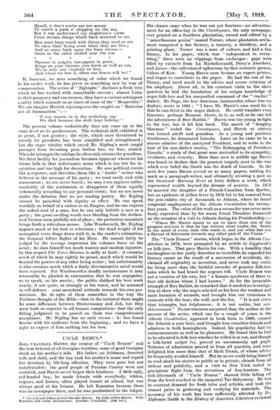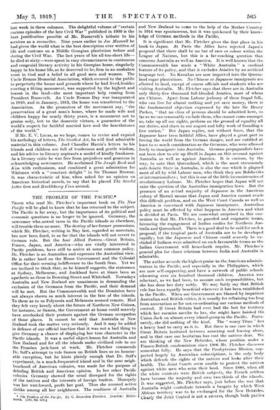UNCLE REMUS.*
JOEL CHANDLER HARRIS, the creator of "Uncle Remus" and the best beloved of all Georgian worthies, came of good Georgian stock on his mother's aide. His father, an Irishman, deserted wife and child, and the boy took his mother's name and repaid her devotion by life-long affection. They were poor but not unbehiended ; the good people of Putnam County were not snobbish, and Harris never forgot their kindness. A little ugly, red-headed boy, he made friends with everybody, whites, negroes, and horses; often played truant at school, but was always good at his lessons. He left Eatonton because there was no newspaper there, and he was predestined to the inkpot.
r:ALIt.1,1'dot:Ifig4fg,Z"Zecrsit'g:'&,trat,IT‘ Collier Harris. With His chance came when he was not yet fourteen—an advertise- ment for an office-boy in the Countryman, the only newspaper ever printed on a Southern plantation, owned and edited by a "miscellaneous genius" named Turner, whose plantation settle- ment comprised a hat factory, a tannery, a distillery, and a printing plant. Turner was a man of culture, and had a fine library. In his paper, which was "independent in every- thing," there were no clippings from exchanges : gaps were filled by extracts from La Rochefoueauld, Percy's Anecdotes, and Luau—the collection of aphorisms by that eccentric parson, Colton of Kew. Young Harris soon became an expert printer, and began to contribute to the paper. He had the run of the library, and owed much to the advice and severe criticism of his employer. Above all, in his constant visits to the slave quarters he laid the foundation of his unique knowledge of negro folk-lore and his unequalled command of the " cracker " dialect. Mr. Page, the late American Ambassador, whose loss we deplore, wrote in 1881 : " I have Mr. Harris's own word for it that he can think in the negro dialect. He could translate even Emerson, perhaps Bronson Alcott, in it, as well as he can tell the adventures of Brer Rabbit." Harris was too young to fight in the war, but it hit him hard. The march of " doughty Sherman" ended the Countryman, and Harris at sixteen was turned adrift and penniless. As a young and patriotic Southerner, he denounced Lincoln. Later on he came to be a sincere admirer of the martyred President, and to write in the best of his non-dialect stories, "The Kidnapping of President Lincoln," a study of that great man unrivalled in its sympathy, vividness, and veracity. More than once in middle age Harris was heard to declare that the greatest tragedy next to the war which ever befell the South was the death of Lincoln. In tho next five years Harris served on as many papers, making his mark as a paragraph-writer, and ultimately securing a post on the Savannah Morning News at forty dollars a week, which represented wealth beyond the dreams of avarice. In 1873 he married the daughter of a French-Canadian from Quebec, but an epidemic of yellow fever in 1876 led to his removal from the pest-ridden city of Savannah to Atlanta, where he found congenial employment on the Atlanta Constitution for twenty- four years. The value of his work as a reconciler was never more finely expressed than by his warm friend Theodore Roosevelt on the occasion of a visit to Atlanta during his Presidentship :— " Where Mr. Harris seems to one to have done one of the greatest services is that he has written what exalts the South in the mind of every man who reads it, and yet what has not a flavour of bitterness towards any other part of the Union."
The "Uncle Remus" stories, which began in the Atlanta Con- stitution in 1878, were prompted by an article in Lippincott's on folk-lore. That gave Harris his cue. With a humility that hisdaughter-in-law justly describes as incredible,he regarded his literary career as the result of a succession of accidents, dis- claimed all originality or invention, and never took any credit for being more than the faithful recorder of genuine folk-lore tales which he had heard the negroes tell. Uncle Remus was not a creation of his own, but " a human syndicate of three or four old darkies whom I had known." As for the invariable triumph of Brer Rabbit, he remarked that it needed no investiga- tion to show why the negro selected as his hero the weakest and most harmless of animals, and brought him out victorious in contests with the bear, the wolf, and the fox. " It is not virtue that triumphs, but helplessness; it is not malice, but mis- chievousness." No onewasmore surprised than the author at the success of the series, which ran for a couple of years in the Atlanta Constitution, appeared in book form in 1880, crossed the Atlantic a year later, and brought him countless friends and admirers in both hemispheres. Indeed, his popularity had its embarrassments as well as its pleasures. He found that he had to be educated in folk-lore whether he willed it or not, and though a folk-lorist malgre lui, proved an uncommonly apt pupil. Tributes of admiration poured in from all quarters, and none delighted him more than that of Mark Twain, of whose advice he frequently availed himself. at he never could bring himself to read aloud his stories in public or in private, shrank from all riclame and publicity, and a visit to New York ended in precipitate flight from the attentions of lion.hunters. The rich aftermath of "Uncle Remus" showed little falling off from the level reached in the immortal Tar-Babystory. He was in constant demand for fresh tales and articles, and took the utmost pains in gathering and verifying his materials. The accuracy of his work has been sufficiently attested by Dr. Alphonse Smith in the History of American Literature reviewed
last week .in these columns. The delightful volume of "certain curious episodes of the late Civil War" published in 1900 is the best justification possible of Mr. Roosevelt's tribute to his services as a reconciler. Nine years earlier in Joe Maxwell he had given the world what is the best description ever written of life and customs on a Middle Georgian plantation before and during the Civil War. The last years of his all-too-short Mos- he died at sixty—were spent in easy circumstances in continuous and congenial literary activity in his Georgian home, singularly happy in his home life, as he deserved to be, firm in an unshaken trust in God and a belief in all good men and women. The Uncle Remus Memorial Association, which secured to the public in perpetuity the house and grounds where he had lived, besides erecting a fitting monument, was supported by the highest and lowest in the land—the most important help coming from President Roosevelt. An Uncle Remus Day was inaugurated in 1910, and in January, 1913, the home was transferred to the Association. As the promoters of the movement say, the preservation of a great man's home, where he made wife and children happy bar nearly thirty years, is a, monument not to genius only, but to the domestic virtues, a guarantee of the world's respect for faithful married love and the hearthstones of the world."
If Mr. E. V. Lucas, as we hope, comes to revise and expand his anthology of letters, The Gentlest .4r1, he will find admirable material in this volume. Joel Chandler Harris's letters to his friends and children are full of tenderness and gentle wisdom, and his advice to literary aspirants a model of kindly frankness. As a literary critic he was free from prejudices and generous in acknowledging newcomers. He acclaimed The Jungle Book and kin; with enthusiasm, and combined a great admiration for Whitman with a "constant delight" in Sir Thomas Browne. It was characteristic of him, when asked for an opinion on American historical novels, to say that he placed The Scarlet Letter first and Huckleberry Finn second.



































 Previous page
Previous page